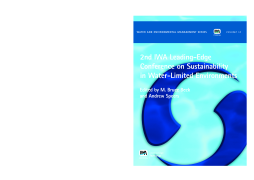
BOOK
2nd IWA Leading-Edge on Sustainability in Water-Limited Environments
(2006)
Additional Information
Book Details
Abstract
This book represents the outcome of the Second IWA Leading-Edge Conference held in Sydney, Australia in November 2004. Sustainability is a paradoxical concept. We know we want to protect the environment from human-induced change, yet ecosystems are dynamic, constantly changing and adapting in response to a multitude of factors, the combined effect and subtleties of which are probably well beyond human calculation. Furthermore, our conscious desire to protect the environment - which forces us to think of humans as sitting outside ecosystems - conflicts with the unavoidable fact that we are an unconscious actor within those ecosystems. We must also recognise that the goal of "protecting the environment" is not a clear-cut objective. Perhaps, because of its complexity and propensity to change, we cannot know what the fully protected environment would look like. Individual preferences too make the conceptualisation of an ideal state impossible; do we strive for an ecosystem in which we play a minor part - barely influencing natural outcomes - or one that is more actively managed and provides for our needs or wants? Neither this volume, nor the conference from which it draws, resolve the paradoxes described above. The papers presented here do, however, provide insight into the innovative thinking and practical projects undertaken across the globe that move us from patently unsustainable conditions to those in which our economic activity, impact on ecosystems and desire for positive social outcomes are in better balance.
Table of Contents
| Section Title | Page | Action | Price |
|---|---|---|---|
| 2nd IWA Leading-Edge Conference on Sustainability | ii | ||
| Contents | vi | ||
| Preface | x | ||
| Sustainability — Seen in Sydney | 1 | ||
| Challenges of water-limited environments | 7 | ||
| Freshwater supply and self-irrigation of plants in water-limited environments by fog precipitation | 7 | ||
| Socially fair and environmentally sound developments in the programme for rural water supply on the Lesser Sunda Islands (Nus | 15 | ||
| New approaches to decision making: beyond cost–benefit analysis | 25 | ||
| Assessing water service provision scenarios using the concept of sustainability | 25 | ||
| The secret life of water systems: least cost planning beyond demand management | 35 | ||
| The use of sustainability criteria for the selection and comparison of sanitation systems | 42 | ||
| Selection of indicators for sustainable management of an urban stormwater system | 50 | ||
| A decision support tool for implementing a sustainable resource management in the sector of municipal wastewater treatment | 57 | ||
| The human dimension in sustainability | 67 | ||
| Sustainability management by water utilities: views across Australia, Europe and the USA | 67 | ||
| GLOWA Jordan River Project: integrated research for sustainable water management | 73 | ||
| Systems planning for sustainability | 81 | ||
| Centralised versus decentralised wastewater systems in an urban context: the sustainability dimension | 81 | ||
| Characterization and optimization of small-scale farming communities for material recovery and sustainable management. The ca | 90 | ||
| Demonstration-project DEUS 21: a concept for a sustainable urban water infrastructure | 104 | ||
| The characteristics of household wastewater and biodegradable solid waste – a proposal for new Swedish design values | 112 | ||
| Synergy in the city: making the sum of the parts more than the whole | 125 | ||
| Leading-edge technologies for sustainability | 136 | ||
| Advanced sanitation with the vacuum truck collection system of human excreta | 136 | ||
| A sustainable approach towards rural development: dry toilets in Nepal | 145 | ||
| Separate discharge and treatment of urine, faeces and greywater: demonstration project in Berlin, Germany | 153 | ||
| Use of constructed wetlands in treating recirculating aquaculture water for in-door intensive shrimp production | 161 | ||
| Decolourising yellow water for its reuse in sustainable sanitation | 171 | ||
| Health, hygiene and risk | 179 | ||
| Bacterial water quality of rainwater fed domestic hotwater systems | 179 | ||
| Microbial risk assessment tool to aid in the selection of sustainable urban water systems | 187 | ||
| Governance for sustainability | 196 | ||
| Governance for sustainability in water resource management: the role of collaborative decision making | 196 | ||
| Privatisation of municipal waterworks and sustainability of water: a case study in eastern Jakarta, Indonesia | 205 | ||
| The Water Reclamation Matrix: a framework for sustainable urban water use | 216 | ||
| Keyword index | 225 |
